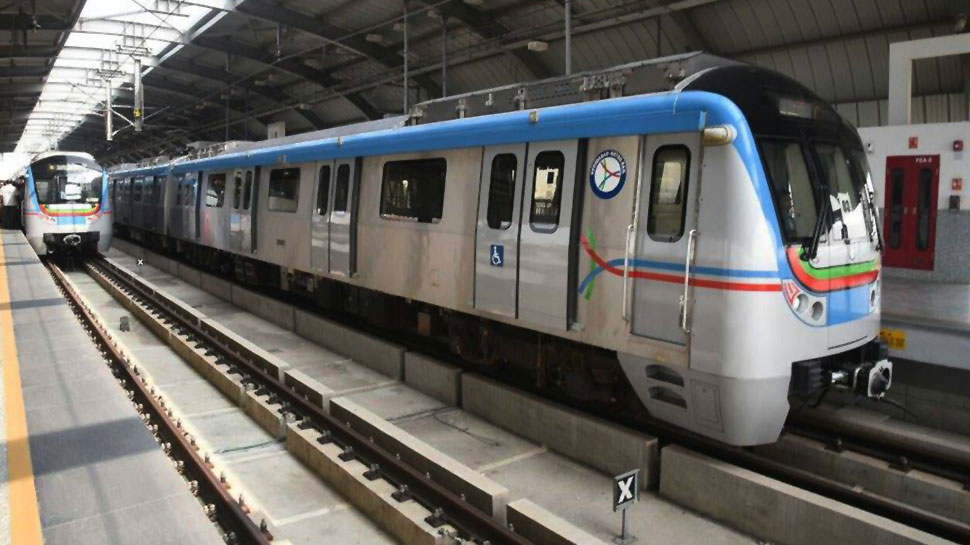Telangana Industries and IT Minister D Sridhar Babu criticised the inaction, saying the delay amounts to political discrimination by the BJP-led NDA government, particularly when ₹3,626 crore was recently approved for the Pune Metro’s expansion in BJP-ruled Maharashtra.

The proposed expansion under Phase II-A and Phase II-B aims to extend connectivity by 162.5 km.
Synopsis: The Congress-led Telangana government has criticised the Centre’s decision to defer approval for Hyderabad Metro Rail Phase II proposals, calling the delay “political discrimination” despite the state fulfilling all project and funding requirements. The ₹43,848 crore expansion aims to extend metro connectivity by 162.5 km across underserved areas of Hyderabad.
The Union government’s decision to defer approval for the Hyderabad Metro Rail Phase II proposals at its Cabinet meeting on 25 June has drawn sharp criticism from the Congress-led Telangana government.
Despite submitting detailed project reports (DPRs), obtaining administrative clearances, and expressing readiness to co-fund the ₹43,848 crore project (covering Phase II-A and Phase II-B), the Union government has not moved forward.
Telangana Industries and IT Minister D Sridhar Babu criticised the inaction, saying the delay amounts to political discrimination by the BJP-led NDA government, particularly when ₹3,626 crore was recently approved for the Pune Metro’s expansion in BJP-ruled Maharashtra.
“It is political discrimination. Though Hyderabad contributes to the national economy significantly and after fulfilling all administrative requirement, our proposals were pushed back,” he said.
Chief Minister A Revanth Reddy had met Union Minister Manohar Lal Khattar in New Delhi on 19 June, seeking clearance for Metro Rail Phase II. Reddy reiterated the state’s readiness to implement the project as a 50:50 joint venture.
Even so, the Cabinet meeting held a week later did not include the Hyderabad Metro proposals on its agenda, Sridhar Babu pointed out.
The minister said that all required documents, DPRs, and clearances had been submitted, and questioned what more the Centre needed.
Also Read: Hyderabad Metro Rail ups fares with prices ranging between Rs 12 and Rs 75
Expansion aims boost connectivity across Hyderabad
The Telangana government has proposed a major expansion of the Hyderabad Metro network under Phase II-A and Phase II-B, aimed at extending connectivity by 162.5 km.
The planned routes would serve underserved areas such as the Old City, the airport corridor, IT hubs, and rapidly growing suburbs.
Phase II-A, approved by the Telangana Cabinet in July 2024, includes five corridors adding up to 76.4 km, with an estimated cost of ₹24,269 crore.
DPRs, traffic studies, and administrative documentation were submitted to the Union Ministry of Housing and Urban Affairs (MoHUA) in November 2024.
Phase II-B, which includes three additional corridors spanning 86.1 km and costing ₹19,579 crore, received state Cabinet approval on 5 June 2025.
The DPRs for this phase were formally submitted to the Centre on 21 June – just four days before the Central Cabinet meeting that did not include the proposals.
Together, these expansions are intended to transform Hyderabad’s metro network into one of the most extensive in the country, extending its total length to 231.5 km.
The expanded network is projected to increase daily ridership to over 13 lakh passengers, up from the current 5 lakh.
Also Read: Telangana Cabinet approves metro extension to future city from airport and beyond; addresses employee demands
Corridors in Phase II-A
- Corridor I (Nagole–RGIA via Aramghar): A 36.8 km link connecting the eastern part of the city to the international airport.
- Corridor II (Raidurg–Neopolis): An 11.6 km extension into the Financial District, intended to ease commuting for the IT sector.
- Corridor III (MGBS–Chandrayangutta): A 7.5 km line through the historic Old City, which will require land acquisition from over 1,000 properties.
- Corridor IV (Miyapur–Patancheru): A 13.4 km route extending to the north-west industrial zones.
- Corridor V (LB Nagar–Hayathnagar): A 7.1 km extension along the Vijayawada Highway.
Phase II-B corridors
- Corridor IX (RGIA–Bharat Future City): A 39.6 km line connecting the airport to a proposed urban and skills development hub.
- Corridor X (JBS–Medchal): A 24.5 km corridor to the city’s northern suburbs.
- Corridor XI (JBS–Shamirpet): A 22 km line linking north-eastern Hyderabad to key educational and research institutions.
Funding
Together, the two phases require a total investment of ₹43,848 crore, with the following funding structure:
- Telangana Government: ₹13,187 crore (30 percent)
- Union Government: ₹7,484 crore (18 percent)
- Multilateral Loans (JICA, ADB, etc.): ₹21,091 crore (48 percent)
- Public-Private Partnership: ₹1,816 crore (4 percent)
Multilateral loans require sovereign guarantees from the Union government, making Cabinet approval critical for the project’s execution.
The Telangana government has already allocated ₹500 crore in its state budget to initiate preliminary works, including ₹125 crore earmarked for road widening in the Old City corridor. However, further progress depends on the Centre’s formal approval.
(Edited by Dese Gowda)









